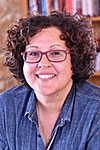Writers bring life observations, political activism to Victoria
The University of Houston-Victoria Downtown Arts Series will kick off its fall series with a pair of writers who bring personal observations to life through their stories and poems.
Writer and educator Christine Granados and poet, educator and activist Lupe Méndez will read selected stories and poems at 7 p.m. on Sept. 30 in the UHV Center for the Arts, 204 N. Main St. The event is free and open to the public.
“Christine and Lupe are amazing, talented writers who have a gift for facing the world as it is and sharing that truth with others,” said Charles Alexander, UHV poet and designer in residence and co-curator of the series. “We are delighted to present this Texas novelist and Texas poet, both extraordinary individuals, to the Victoria community.”
Granados’ journey toward writing began with a desire to help her mother relax. Her mother worked a full-time job and had to feed and care for a husband and four children, and Granados remembers her mother as always being tense.
“The only time I ever saw her look peaceful was when she was reading,” Granados said. “My other siblings were funny, good story tellers and had ways of entertaining her to ease her tension, but I wasn’t any of those things, and I just wanted to make her relax that same way. When I published my first collection, I gave her a copy and hid in the hallway, so I could see her read. I finally got to entertain and relax her.”
Granados, a former UHV lecturer, started her writing career as a journalist at the El Paso Times, where she worked through college. Even though she wanted to write stories and be published, journalism seemed to be a more practical profession that paid the bills, she said.
However, when she started working for a magazine, she met and interviewed other writers. Once, Granados interviewed author Dagoberto Gilb and started talking with him about her writing. Gilb, a UHV professor of Latin studies, invited her to an informal writing workshop he was hosting.
After she attended the workshop, Gilb encouraged her to apply for a writing program and gave her a list of writers she should study.
“There were so many wonderful writers on that list who I had never heard of,” she said. “When I started to read their work and catch up on my literary education, I began to understand what went into writing a short story.”
In her own stories, Granados tends to explore topics that look at life through laughter, sadness or confusion. She is drawn to working women’s family issues.
One of her works, “Fight Like a Man,” is a story that focuses on a polygamous man. The story follows the illegitimate daughter of a Mexican man in El Paso who has another family in Mexico.
“That situation, where two families share one father, happens all across the border,” Granados said. “It’s a unique kind of dysfunction that ties into many different social themes, including the topic of immigration.”
Social issues are some of the major topics of Méndez’s poetry as well as his activism. A teacher at Cristo Rey Jesuit High School in Houston, Méndez draws from his experiences and uses writing as an opportunity to deal with and share cultural experiences.
Méndez founded Tintero Projects, a Houston organization that works with Latino writers and other writers of color to build them up. Tintero is the Spanish word for inkwell, which references the importance of writers drawing from their own wells of inspiration to create their work.
When he does his own writing, Méndez draws inspiration from a seemingly endless supply of sources.
“Sometimes I’ll have a flash of an idea, such as a couple of words that could become a line or title,” he said. “I write it down or put it in my phone, and later I’ll come back and look over all these fragments to find an idea or narrative that floats and comes together on paper.”
Recently, “Aguacero,” a poem Méndez wrote about Hurricane Harvey, was published in the Houston Chronicle along with several other poets’ pieces. The city saw severe flooding during the storm, and Méndez references a Washington Post article that said if all the water that fell on Houston was spread over the U.S., it would be three pennies high.
“That led me to imagine this flooding and all the rain as a downpour of pennies,” Méndez said. “The poem became this look at what enduring 12 hours of rain does to people, their sanity and their neighborhood.”
In one of his more colorful essays, “On Empathy, Apathy and Giving No F***s,” Méndez takes a deeper look at the flip side of the popular views of empathy and apathy. Instead of empathy being a positive emotion, it often can be just a surface expression while the true intention is more of a selfish attempt to make someone feel better instead of trying to truly be a loving, caring individual.
“However, apathy, which usually is seen as cold and uncaring, has a useful side when people reach their wit’s end and have to make themselves stop caring about something,” Méndez said. “That forces them to say things that must be said so they can address an issue and move on. In the end, the right kind of apathy can be a tool.”
For more information about the Downtown Arts Series, contact Alexander at 361-703-5147 or alexanderch@uhv.edu.
The University of Houston-Victoria, located in the heart of the Coastal Bend region since 1973 in Victoria, Texas, offers courses leading to more than 80 academic programs in the schools of Arts & Sciences; Business Administration; and Education, Health Professions & Human Development. UHV provides face-to-face classes at its Victoria campus, as well as an instructional site in Katy, Texas, and online classes that students can take from anywhere. UHV supports the American Association of State Colleges and Universities Opportunities for All initiative to increase awareness about state colleges and universities and the important role they have in providing a high-quality and accessible education to an increasingly diverse student population, as well as contributing to regional and state economic development.
Lauren Hightower-Emerson
361-570-4342







